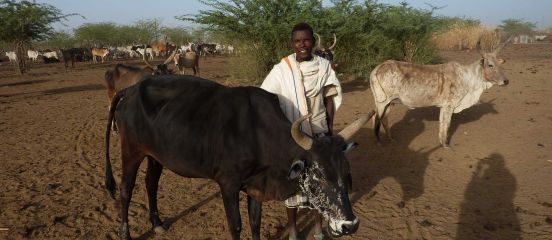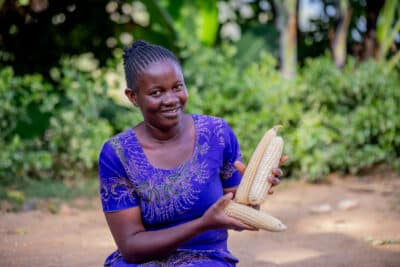News
23 November 2015
Farm Africa helps drought-affected pastoralists in Ethiopia

As severe drought continues to affect many parts of Ethiopia, Farm Africa is helping pastoralists in the Afar region access affordable animal fodder.
Pastoralism is the predominant economic and social mainstay of the population of Afar with around 90% of the region’s total population depending on rearing and moving with livestock herds.
The drought, which climate experts partly attribute to this year’s El Niño effect, has led to extreme shortages of water and pasture. The weight and condition of livestock has deteriorated across the region, reducing their sale value. Demand and prices for livestock have fallen sharply at the time of year when they would normally increase, with this year animals fetching just 40% of their usual prices.
Farm Africa’s Market Approaches to Resilience project is responding to the drought as well as improving the availability of fodder in normal years by processing sugar cane byproducts, particularly tips/leaves and molasses, as an additional, cheap animal feed.
The sugar cane byproducts should allow 30,000 people in 5,000 households to feed their 55,000 livestock (25,000 goats and sheep, 15,000 cattle and 15,000 camels).
Matthew Sulllivan, Farm Africa’s Programme Manager, commented:
“Ethiopia has done a great deal to build its resilience to natural disasters over the last three decades, so the impacts of this year’s drought will not be nearly as bad as in past episodes. However, extreme weather conditions are having an impact on environmentally vulnerable pastoralist communities and Farm Africa is helping to further build their resilience to withstand climate shocks.”
In the areas of Afar where Farm Africa is operating an estimated total of more than 500,000 livestock is reported to require emergency assistance, including animal feed, this year.
Sugar cane was identified as a suitable alternative animal fodder as it produces a greater quantity of carbohydrate than any other tropical crop.
Farm Africa will increase the access to affordable sugarcane by-products, and other animal fodder, through a market-based approach, creating initial awareness of the product and raising demand for it by providing fodder vouchers to herders most affected by drought, and working with the private sector, local traders and cooperatives to stimulate supply, including through provision of credit.
The approach will contribute towards keeping markets functioning during the drought, preventing excess livestock deaths, and enabling vulnerable pastoralists to retain their core breeding herd.
Part of the UK Government funded BRACED (Building Resilience and Adaptation to Climate Extremes and Disasters) programme, Market Approaches to Resilience is an innovative three year project that will test market-based approaches to improving the resilience of vulnerable pastoralist households to climate change in the Afar.




